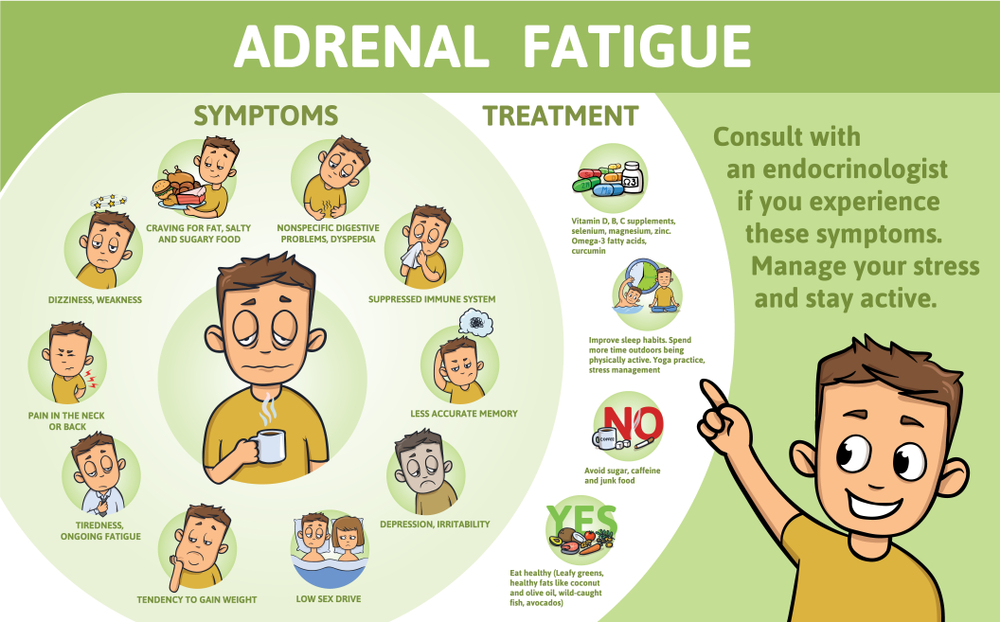The Holistic Approach to Adrenal Fatigue and Stress: Supporting Your Health With Nutritional Care

Table of Contents
In today’s fast-paced world, stress and adrenal fatigue have become common culprits affecting our well-being. The holistic approach to managing these conditions encompasses nutritional care, addressing the root causes of the issues while promoting overall health and vitality. Let’s delve into how this comprehensive approach can support your body’s natural balance and help you reclaim a healthy, energized life.
Understanding Adrenal Fatigue and Stress
In our always-on world, the buzz of stress seems almost unavoidable, often leading to the sneaky disruptor known as adrenal fatigue. Our adrenal glands play a pivotal role in how we handle the pressures of life, releasing hormones like cortisol to manage stress. But when they’re overworked, symptoms such as tiredness, cravings for salty foods, and feelings of being overwhelmed can creep in, impacting our daily lives and well-being. Let’s unpack what’s going behind the scenes in our bodies and get to grips with the effects of adrenal fatigue.
The Role of Adrenal Glands in Stress Response
When life throws a curveball, your body has a special team that steps up to the plate: your adrenal glands. These tiny but mighty glands sit atop your kidneys like little hats, ready to join the game at a moment’s notice. They’re critical players in how your body handles stress. When you’re in a pinch, they secrete hormones like adrenaline and cortisol. These hormones are like your body’s internal alarm system, they signal your body to hop into action mode—they increase your heart rate, boost your energy, and sharpen your focus. Think of them as your body’s pep-talk before the big game.
But what happens when this system gets overworked? Constant stress can make your adrenal glands feel like they’re always in overtime. When your body’s stress-response team is always on, it can lead to what some people call “adrenal fatigue.” This isn’t just about feeling a bit tired—it’s a full-blown exhaustion that can mess with your sleep, mood, and even how you handle future stress. Imagine a soccer player running nonstop for hours; eventually, their performance is going to take a hit. That’s your adrenal glands under constant stress. They need a balanced approach to get back into shape, and that’s where the holistic path shines.
Symptoms and Effects of Adrenal Fatigue
Feeling tired all the time? You might be experiencing adrenal fatigue, a condition where your adrenal glands can’t keep up with the stress of your busy life. Your adrenal glands are little hats on top of your kidneys, and they’re super important for managing stress.
Common symptoms include:
- A deep sense of tiredness, especially in the morning
- Trouble getting to sleep or waking up
- Craving for salty or sweet snacks
- Brain fog or difficulty concentrating
Beyond just feeling worn out, adrenal fatigue can mess with your immune system, making you more likely to catch colds or other infections. It can also lead to a drop in blood pressure, making you feel dizzy when standing up too fast. If your body’s alarm system is stuck in the “on” position, it’s like your phone’s battery is always draining. So, if you’re feeling more slug than superstar, it might be time to listen to what your body is whispering before it starts shouting.
Holistic Nutritional Care

When it comes to combating stress and adrenal fatigue, what you eat plays a powerful role. Holistic Nutritional Care is all about choosing foods that fuel your body, restore your energy, and help you feel balanced. Think of it as nourishing your body from the inside out, using food as medicine to support recovery and build resilience to life’s daily pressures. Now, let’s dive into how adjusting your diet and supplements can make a huge difference in how you feel.
Balancing Diet for Adrenal Health
Eating right plays a massive role in tackling adrenal fatigue and stress. A well-balanced diet is key—it should be filled with wholesome foods that nourish your body and give your adrenal glands a much-needed break. Think of your diet as a support system for your adrenals, which are working overtime to manage stress.
To start, make sure your meals include a good mix of proteins, healthy fats, and complex carbohydrates. These are the building blocks that keep your body energized and ready to defend against the day’s challenges. Fruits and vegetables are also superstars, packed with vitamins and minerals that help your adrenals stay in tip-top shape. So, next time you’re at the grocery store, load your cart with colorful produce, lean meats, and whole grains—it’s a simple step that can make a big difference in your health.
Key Nutrients and Supplements for Adrenal Support
When you’re feeling worn down and your energy is lagging, it might be your body giving you a heads-up: your adrenal health needs attention. Nutrients and supplements can be true allies in bolstering your adrenal glands. Think of them as power-ups in a video game, helping you restore your strength and keep you moving forward.
First on the list are B-vitamins, especially B5, B6, and B12. They’re like the three musketeers for your adrenal glands, working to enhance energy production and support your body’s stress response. Then there’s Vitamin C, a well-known helper for the immune system, but also a critical supporter for your adrenals because of its role in producing cortisol.
Magnesium steps in as the relaxation mineral. If you’re often tense or can’t seem to unwind, magnesium could be your go-to nutrient, assisting in calming the nervous system. Adaptogenic herbs, although not strictly a nutrient, deserve a shoutout. Herbs like ashwagandha and rhodiola help your body adapt to stress, hence the name ‘adaptogens’.
Don’t forget about Omega-3 fatty acids, found in fish oil, which are crucial for combating inflammation that might be a result of chronic stress. And lastly, probiotics may not be the first thing you think of for adrenal support, but a healthy gut is crucial for overall health and stress management. So, it’s worth considering them as part of your adrenal care toolkit.
Remember, diving into supplements should be a thoughtful process. Always chat with a healthcare provider to make sure you’re choosing what’s best for your unique body.
Lifestyle Practices for Holistic Wellness

A balanced life is about more than just eating right; it includes everything you do, from your morning meditation to your nightly jog. By focusing on stress-reducing habits and keeping active, you can strengthen your body’s resilience against the wear and tear of everyday pressures. These lifestyle adjustments are key pillars in recovering from adrenal fatigue and managing stress. Let’s explore how you can revitalize your routine for optimal wellness.
Stress-Reducing Techniques and Mindfulness Practices
When life speeds up and the to-do list seems endless, your body’s alarm system — the adrenal glands — go into overdrive. To dial back the pace and give these tiny powerhouses a break, stress-reducing techniques can work wonders. Mindfulness practices, for example, anchor you to the present moment, quieting the endless chatter of the mind.
With just a few minutes a day, practices like meditation or deep-breathing exercises can make a noticeable difference. Start with deep breaths, in through the nose and out through the mouth, feeling stress melt away with each exhale. Or take up meditation, focusing on your breath or a calming word to help center your thoughts. Over time, these practices strengthen your resilience against stress, like a muscle that gets stronger with exercise.
By incorporating mindfulness practices into your daily routine, your mind gets a much-needed pause, and your adrenal glands get a chance to regroup. It’s not a quick fix, but a daily dose of tranquility might be just what the doctor ordered.
The Role of Exercise in Adrenal Fatigue Recovery
Moving your body can do wonders when you’re dealing with adrenal fatigue. Exercise isn’t just about getting fit; it’s a powerful tool for resetting your stress response system. When you’re strategically active, it signals your body to stabilize the production of cortisol, the stress hormone that adrenal glands pump out.
But it’s not about pushing yourself to the max. Moderate exercise like a brisk walk, yoga, or swimming can help improve mood, reduce fatigue, and enhance energy levels without overtaxing your body. The key is to listen to your body’s signals and find a balance that invigorates rather than exhausts you. Engaging in regular, gentle exercise can be a game-changer in your recovery journey.
Herbal Support for Adrenal Health

Herbs have been used for centuries to support overall health, especially when it comes to dealing with stress and adrenal fatigue. These natural allies, known as adaptogenic herbs, are particularly prized for their ability to help the body resist and recover from stress. By integrating herbal remedies into your daily routine, you can offer your adrenal glands much-needed support, enhancing the body’s resilience and assisting in the journey to a more energized and balanced state.
Adaptogenic Herbs and Their Benefits
Have you ever heard of adaptogenic herbs? They are like nature’s own stress relief squad! Adaptogens are unique because they help your body fight against all kinds of stress, whether it’s physical, chemical, or biological. They are champions at balancing out our bodies and figuring out what we need to get back to feeling great.
For example, adaptogens like Ashwagandha can calm you down and boost your energy at the same time without making you feel jittery. Another powerhouse herb, Rhodiola Rosea, is known for fighting fatigue and even helping your brain work better. From Siberian Ginseng that revs up your immune system, to Holy Basil that helps you chill out, these herbs are packed with benefits that keep you strong in the face of stress.
Incorporating Herbal Remedies into Daily Routine
Introducing herbal remedies into your daily life can feel like a breath of fresh air for your overworked adrenal glands. Imagine these natural wonders as your little helpers, ready to offer support when stress knocks on your door. Adaptogenic herbs, those that help the body adapt to stress, are particularly helpful. They work like a thermostat, balancing and tuning your body’s response to stress, whether you need a nudge to pick up the pace or a signal to wind down.
Starting with herbs like ashwagandha, holy basil, and rhodiola can make a significant difference. You might add a spoonful of ashwagandha powder into your morning smoothie or sip on holy basil tea before bedtime to encourage relaxation. Remember, it’s all about making these herbs a part of your routine without feeling like it’s a chore. The key is consistency and choosing the form — teas, tinctures, capsules — that you’ll stick with. Over time, these herbal allies can contribute to your sense of calm and collectedness amidst life’s storms.
The Mind-Body Connection

An often-overlooked aspect of our health is the powerful link between our mental and physical states—it’s the mind-body connection that whispers a profound truth: how we think and feel can directly affect our bodily health. When it comes to adrenal fatigue and stress, nurturing this connection is not just beneficial; it’s essential. By diving into the intricate relationship our mindset plays in health, and exploring therapies that tap into this connection, we can open doors to avenues of healing that go beyond the physical, thereby fostering resilience in the face of stress.
Understanding the Influence of Mindset on Adrenal Health
Our mind is powerful, playing a crucial role in our overall health, including how our adrenal glands function. Adrenals, tiny but mighty, sit atop our kidneys and manage our stress response, but they’re sensitive to negative thoughts and chronic stress. A positive mindset isn’t just a state of mind; it can lead to real, physical changes, tipping the scales towards health and vitality.
When we harness the power of positive thinking, we pave the way for a healthier stress response. It’s all about snapping out of the doom and gloom and inviting more cheer into our lives. Implementing mindfulness practices such as meditation or journaling can shift our mental gear, steering clear from the stress lane and cruising down the wellness highway. Embrace a can-do attitude, and watch your adrenal health possibly sparkle with gratitude.
Mind-Body Therapies for Stress Management
In the quest for tranquility and adrenal health, mind-body therapies stand out as powerful allies. These therapeutic practices hinge on the belief that your mental state can affect your physical well-being, and vice versa. By engaging in activities such as meditation, yoga, and deep-breathing exercises, you can promote a sense of calm that helps your body to unwind and recover from stress.
It’s not just about feeling peaceful — these therapies can have tangible benefits for adrenal health. For instance, meditation has been linked to lower cortisol levels, the stress hormone that the adrenal glands produce. By regularly incorporating these practices into your routine, you actively help regulate stress responses and nurture your adrenal glands. Embracing these methods provides a non-invasive, drug-free approach to managing stress and supporting overall health.
Embracing a Holistic Approach to Adrenal Health
Embarking on a journey toward adrenal health means looking at your body as a whole. It’s not just about popping a pill when you feel tired or stressed; it’s about nurturing your body from all angles. A holistic path includes harmonizing your diet, optimizing your use of supplements, engaging in stress-busting activities, and embracing herbal remedies that enhance your body’s resilience.
This all-encompassing strategy understands that every part of our lifestyle impacts our well-being. By aligning various aspects of our life, we create a supportive environment for our adrenal glands, which play a crucial role in managing stress. Transforming your health requires patience and commitment, but the holistic route paves the way for long-lasting vitality and balance.
Conclusion
By integrating holistic nutritional care, lifestyle practices, herbal support, and the mind-body connection, a comprehensive approach to addressing adrenal fatigue and stress can be adopted. Embracing a holistic approach allows for a deeper understanding of the interconnectedness of bodily systems, nurturing overall health and supporting the body’s natural balance. Start your journey to holistic adrenal health and wellness today!
FAQs
1. What are the holistic approaches to adrenal fatigue?
Holistic approaches address the root causes of adrenal fatigue, focusing on stress management, nutrition, lifestyle changes, and natural remedies. Here are some key areas:
- Stress Management: Practice relaxation techniques like meditation, yoga, deep breathing, and spend time in nature. Prioritize sleep and manage your time effectively.
- Nutrition: Eat a nutrient-dense diet rich in fruits, vegetables, whole grains, and lean protein. Limit processed foods, sugar, caffeine, and alcohol. Consider an adrenal fatigue-specific diet plan.
- Lifestyle Changes: Maintain a regular sleep schedule, go for gentle exercise, and incorporate activities you enjoy. Set boundaries and learn to say no to avoid overload.
- Natural Remedies: Adaptogenic herbs like Rhodiola, Ashwagandha, and Holy Basil can support adrenal function. Consider mineral supplements like magnesium and vitamin C, but always consult a healthcare professional before starting any supplements.
2. How did you cure your adrenal fatigue?
It’s important to understand that “adrenal fatigue” isn’t a recognized medical diagnosis. However, chronic stress can lead to HPA axis dysregulation, which shares similar symptoms. Addressing the underlying stress factors and following a holistic approach as mentioned above can significantly improve energy levels and overall well-being. Remember, individual experiences vary, and consulting with a healthcare professional is crucial for personalized guidance.
3. How do I get my adrenal glands back to normal?
While “normal” adrenal function varies, prioritizing stress management, a healthy diet, and other lifestyle changes can help regulate your HPA axis and improve adrenal function. It’s a gradual process, so be patient and focus on sustainable changes. Consult your doctor for any specific concerns or if symptoms persist.
4. Does L-Theanine help adrenal fatigue?
L-Theanine, an amino acid found in green tea, may offer some benefits for managing stress and anxiety, which can indirectly contribute to adrenal health. However, evidence for its direct impact on adrenal fatigue is limited. Consult your doctor or a qualified herbalist before using L-Theanine, especially if you have any underlying health conditions.
Remember, consistency and patience are key when addressing adrenal health concerns. A holistic approach focused on stress management, healthy living, and professional guidance can lead to significant improvements in your overall well-being.
Useful resources
- Articles:
- Dr. Axe: https://draxe.com/health/adrenal-fatigue/
- The Solution IV: https://thesolutioniv.com/blog/fight-adrenal-fatigue/
- Women’s Health Network: https://shop.womenshealthnetwork.com/collections/adrenal-stress-and-fatigue
- Holistic Wellness Practice: https://www.holisticwellnesspractice.com/hwp-blog/2021/02/15/natural-ways-to-take-care-of-stress-and-adrenal-fatigue
- Books:
- “The Adrenal Cure” by James Wilson
- “Beat the Burnout and Keep Your Energy High” by Shannon Clark
- “The Complete Idiot’s Guide to Adrenal Fatigue” by Cathy Wong
- Websites:
- American Academy of Family Physicians: https://www.aafp.org/pubs/afp/issues/2012/1015/p741.html
- Mayo Clinic: https://www.mayoclinic.org/diseases-conditions/addisons-disease/symptoms-causes/syc-20350293
- National Institute of Mental Health: https://www.nimh.nih.gov/health/publications/stress-listing








This asset is phenomenal. The wonderful information exhibits the maker’s earnestness. I’m stunned and anticipate more such mind blowing posts.
This website is amazing. The excellent content demonstrates the creator’s passion. I’m in disbelief and hope to see more of this incredible content.
Wonderful web site Lots of useful info here Im sending it to a few friends ans additionally sharing in delicious And obviously thanks to your effort
Your posts always provide me with a new perspective and encourage me to look at things differently Thank you for broadening my horizons
Your posts always provide me with a new perspective and encourage me to look at things differently Thank you for broadening my horizons
I don’t think the title of your article matches the content lol. Just kidding, mainly because I had some doubts after reading the article.
Your posts are always so relevant and well-timed It’s like you have a sixth sense for what your readers need to hear
It’s clear that you have a deep understanding of this topic and your insights and perspective are invaluable Thank you for sharing your knowledge with us
This post hits close to home for me and I am grateful for your insight and understanding on this topic Keep doing what you do
Can you be more specific about the content of your article? After reading it, I still have some doubts. Hope you can help me.
Your article helped me a lot, is there any more related content? Thanks!